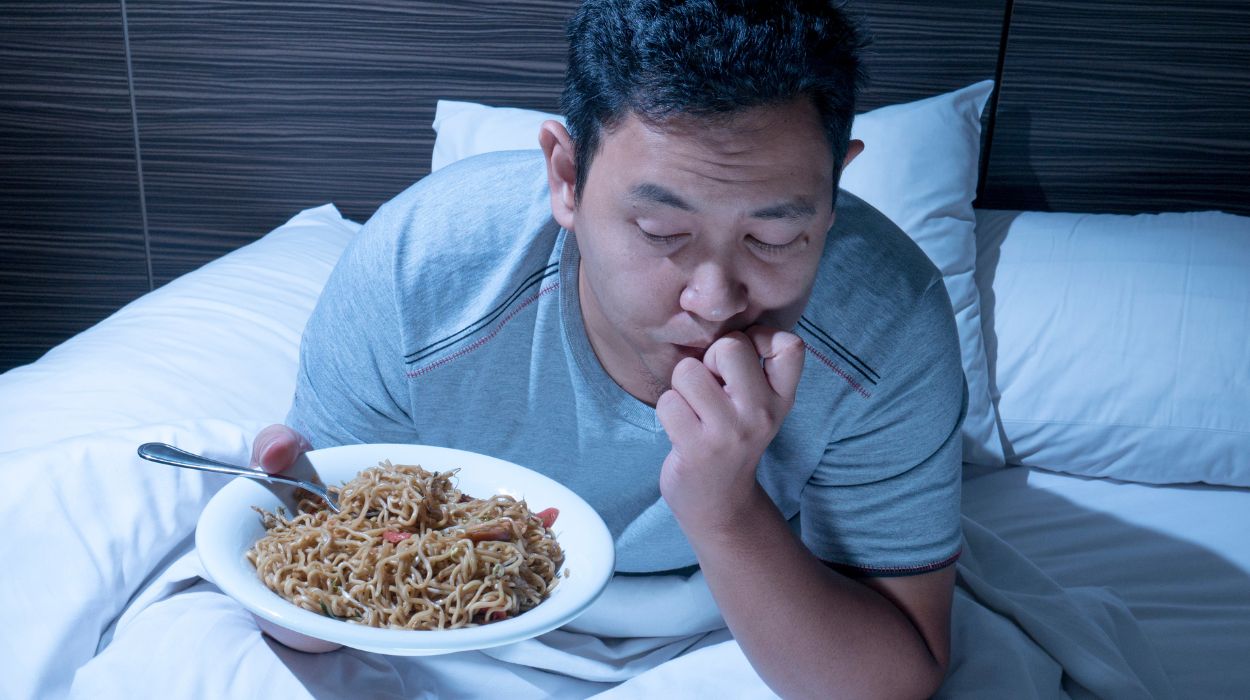It’s so easy to focus on what you eat that you forget how and when you eat are equally important.
Eating shortly before bedtime can cause stomach upset and make sleeping uncomfortable. But that’s not the only downside to eating just before going to sleep. Having a meal close to bedtime can make losing weight hard and, even worse, contribute to weight gain.
So, how long before bed should you stop eating to lose weight? Read on to learn the best time to stop eating, the effects of eating late at night, and what to eat and avoid before bedtime.
Is It Bad To Eat Before Bed?
Yes, it is bad to eat before bed. Going to bed shortly after eating has several negative effects, such as:
- Weight gain and obesity.
- Acid reflux.
- Metabolic syndrome.
- Unhealthy food choices.
- Poor quality sleep.
Hence, we suggest you stop eating two to three hours before bed.
How Long Before Bed Should You Stop Eating to Lose Weight?

Experts have established that diet and physical activity are crucial to weight loss.[1] However, you may be sabotaging your weight loss efforts by eating too late at night.
While there is no established time to stop eating, two approaches may help you know the best time to stop eating at night. They are your circadian rhythm and intermittent fasting.
Circadian Rhythm
Everybody has biological clocks that regulate their circadian rhythms. Circadian rhythms[2] are bodily processes that follow a 24-hour cycle. Examples of these processes include your eating habits, digestion, or sleep cycle.
There are two types of biological clocks: a master clock in the brain and peripheral clocks in the tissues. The master clock responds to light changes in your environment. Peripheral clocks respond to the master clock and other external factors.
Meal timing can influence your peripheral circadian rhythm. Late-night eating disrupts normal hormone regulation. So, there is an increase in ghrelin levels, which stimulates hunger and increases your tendency to eat high-calorie foods.
Additionally, your master clock signals to reduce all digestive processes at night. But when you eat later in the day,[3] your gut is forced to resume work. Hence, your gut clock does not coincide with your master clock, affecting how your body breaks down food and converts it to energy.
Sadly, disruption of hormone regulation and your normal circadian rhythm increases your risk of weight gain and obesity.
Intermittent Fasting
Intermittent fasting[4] involves restricting food intake to a specific time window each day.
Eating according to your specified time window differs slightly from eating according to your body clock. This times your meals and tells you when to stop eating. According to studies, intermittent fasting lowers calorie intake, promotes weight loss, and improves metabolic health.[5]
With intermittent fasting, most people eat within eight hours, like 7 am to 3 pm or 10 am to 6 pm. If you go to bed around 9 pm, having your last meal around 6 pm is great.
Effects Of Eating Or Drinking Late At Night

We’ve all heard that eating and drinking late at night isn’t the best. Let’s dive into what’s going on in your body when you eat late and how it affects your weight loss goals.
Weight Gain And Obesity
Some believe weight gain due to eating before bed is a myth. However, research suggests that a late dinner and having a bedtime snack can predispose a person to obesity.[6]
Acid Reflux
A late-night meal can cause acid reflux, especially if you go to bed shortly after eating. Reflux occurs when stomach acid flows back into the esophagus, a tube connecting the mouth and the stomach. Chronic reflux leads to gastroesophageal reflux disease or GERD.
A 2019 study found that avoiding late-night eating and reducing the size and calorie content of your dinner can control acid reflux.[7]
Metabolic Syndrome
Metabolic syndrome[8] is a group of metabolic disorders, including obesity, insulin resistance, impaired glucose metabolism, high blood pressure, and high cholesterol levels. These conditions predispose a person to diabetes, heart disease, and stroke.
Eating within two hours before bed and having late-night snacks increase the risk of obesity and high cholesterol levels.[9]
Late-night eating also disrupts your circadian rhythm, affecting your sleep. It also increases cravings and calorie intake while reducing the calories you burn, promoting weight gain and the development of metabolic syndrome.
Unhealthy Food Choices
Eating late reduces leptin levels and increases ghrelin levels,[10] resulting in hunger and cravings. Increased cravings predispose you to poor food choices and overeating.
Poor Quality Sleep
Eating too close to bedtime can affect sleep quality. When you eat late at night, your organs and muscles must keep working to digest and absorb your food. With your organs working, you may find it hard for you to fall or stay asleep.
A study showed that eating within three hours of bedtime increased how often people woke up[11] in the middle of the night. The study highlighted that digestion and reflux associated with late eating disrupt sleep.
Consuming certain meals and beverages at night also affects sleep duration. Foods too low or high in fat, as well as high-carb diets,[11] were associated with shorter sleep duration. People who ate such diets experienced multiple arousals because they reduced slow-wave sleep.
Benefits Of Eating Before Bed
Although studies do not recommend eating a large meal shortly before bedtime, a small snack or meal can have several advantages. A healthy snack can help you lose weight by regulating blood sugar levels and curbing nighttime eating. Also, certain foods, like kiwi, nuts, and dairy products, can help you fall asleep faster or stay asleep longer.
Stabilizes Blood Sugar Levels
Persons with diabetes particularly benefit from eating before bed. By eating a high-protein, low-fat evening snack, you help stabilize sugar levels overnight. It also prevents waking up with very high blood sugar levels, which can cause other health problems.
A carbohydrate-based snack at night can also raise low blood glucose levels.[12] Low blood sugar levels can cause nightmares and night sweats,[13] disrupting your sleep.
Helps You Sleep Better
Certain foods contain nutrients and elements that can make you fall asleep faster and improve sleep quality. Research shows that Mediterranean diets[14] and foods rich in tryptophan, serotonin, and melatonin positively affect sleep.
Tryptophan is essential for synthesizing melatonin and serotonin, which are vital in your body’s sleep-wake cycle.
Melatonin’s[15] production increases in the evening, promoting sleep anticipation and regulating the body’s circadian rhythm. Serotonin, on the other hand, induces sleep.
Curbs Nighttime Cravings
Eating a healthy snack before bed can keep you full overnight and stop you from eating later in the night. Skipping dinner may reduce your blood glucose levels and leave you craving carb-rich foods. These cravings also increase your risk of overeating. While nothing will make you lose weight overnight, a good meal and a healthy snack can curb nighttime cravings and prevent overeating.
Best Foods To Eat Before Bed
Try to eat healthy meals and snacks a few hours before bed to promote sleep and weight loss. A healthy diet of whole grains, lean protein, nuts, and fruits is great for bedtime.
Also, discuss sleep and weight loss supplements, including diet pills and fat burners, with your doctor before including them.
Some great choices of foods and drinks you can have before bed are highlighted below.
Kiwi
Kiwi fruit[16] is a great source of melatonin and serotonin. Melatonin and serotonin make falling asleep easier and increase sleep duration, improving sleep quality.
Tart Cherry Juice
Tart cherry juice makes a great late-night snack. Evidence shows that its active ingredient, procyanidin B-2,[17] boosts tryptophan levels and increases sleep time and sleep efficiency.
Almonds And Walnuts
Almonds and walnuts are excellent nut sources of melatonin,[18] which enhances sleep. They also have weight reduction benefits,[19] making them healthier food choices before bed.
Dairy Products
Dairy products[20] such as milk, yogurt, and cheese are great sources of tryptophan and calcium. Tryptophan, a precursor for melatonin and calcium, helps improve sleep habits and quality.
Chamomile Tea
Chamomile tea,[21] a herbal tea, has sedative effects and promotes sleepiness. Also, drinking chamomile tea at night helps control blood sugar levels and aids weight loss.
Foods To Avoid Before Bedtime
Certain foods can negatively influence your sleep and weight. Some of these foods can trigger reflux, heartburn, and stomach upset. Other foods may make it difficult to fall asleep or stay asleep.
Hence, foods to avoid as late-night meals include:
- Spicy foods.
- Sugary snacks and beverages such as candies, chocolate, cookies, and cakes.
- Foods high in sodium, such as chips.
- Foods high in fat, such as fried foods, fatty meats, and full-fat dairy.
- Alcohol.
- Caffeine and caffeine-containing beverages such as coffee and tea.
- Acidic foods such as citrus fruits and tomatoes.
Conclusion
The question of “What time should you stop eating before bed?” is a tricky one. The best time to have your last meal of the day may depend on your individual preferences, hunger levels, work schedule, and cultural practices. Perhaps the right question should be, “How long before bed should you stop eating?
As a rule of thumb, we suggest you finish your dinner two to three hours before bed. Leaving this gap between your last meal and bedtime makes a lot of difference in your sleep and weight loss journey. So, does eating before bed affect weight loss? Yes, it does.
Frequently Asked Questions
Yes, having your dinner early and fasting overnight can help you lose weight. An early dinner can prevent late-night snacking and improve digestion, preventing weight gain.
Yes, you can. Having a light dinner or bedtime snack curbs nighttime cravings and overeating. Also, eating protein-rich and low-fat meals before bed can help you lose weight.
It depends on your bedtime. We recommend eating at least two to three hours before bed to lose weight. It reduces overeating and keeps your body fasting overnight, making it burn fat efficiently for energy.
 Evidence Based
Evidence Based
